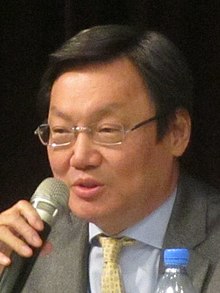Su Chi
Su Chi | |
|---|---|
| 蘇起 | |
 | |
| Secretary-General of the National Security Council | |
| In office 20 May 2008 – 23 February 2010 | |
| Preceded by | Mark Chen Chen Chung-hsin (acting) |
| Succeeded by | Hu Wei-jen |
| Member of the Legislative Yuan | |
| In office 1 February 2005 – 31 January 2008 | |
| Constituency | ROC |
| Minister of the Mainland Affairs Council | |
| In office 1 February 1999 – 19 May 2000 | |
| Preceded by | Chang King-yuh |
| Succeeded by | Tsai Ing-wen |
| Minister of the Government Information Office | |
| In office 10 June 1996 – 15 May 1997 | |
| Vice | David Lee |
| Preceded by | Jason Hu |
| Succeeded by | David Lee |
| Personal details | |
| Born | 1 October 1949 Taichung, Taiwan |
| Political party | Kuomintang |
| Education | National Chengchi University (BA) Johns Hopkins University (MA) Columbia University (MA, PhD) |
Su Chi (Chinese: 蘇起; pinyin: Sū Qǐ; born 1 October 1949) is a Taiwanese politician. Su served as Secretary-General of the National Security Council from 2008 to 2010. Previously, he was the Minister of the Mainland Affairs Council of the Executive Yuan from 1 February 1999 to 19 May 2000.[1]
Su coined the phrase 1992 Consensus in early 2000 to describe the position on One China issues that developed following the October–November 1992 discussions between the Strait Exchange Foundation (SEF) and the Association for Relations Across the Taiwan Straits (ARATS).[2]
Education
[edit]Su graduated from National Chengchi University in 1971 with a bachelor's degree in political science. He then went to pursue graduate studies in the United States, where he earned a master's degree from Johns Hopkins University in 1975, a Master of Arts in political science from Columbia University in 1980, and his Ph.D. from Columbia University in 1984. After earning his doctorate from Columbia, Su was a postgraduate researcher at Harvard University.[3]
Mainland China visit
[edit]2005
[edit]In 2005, Su accompanied Kuomintang Chairperson Lien Chan to visit Nanjing in Jiangsu to meet with the high officials of Chinese Communist Party (CCP).[4]
2013
[edit]In June 2013, Su and delegates led by Kuomintang (KMT) Honorary Chairman Wu Po-hsiung visited China and met with CCP general secretary Xi Jinping. The delegation included KMT Vice Chairpersons Hung Hsiu-chu and Huang Min-hui. This was his first visit to China after he left the National Security Council (NSC), citing that the ROC law prohibits him to visit China at least three years after he had left his NSC post.[5]
Education
[edit]- MA and Ph.D. in political science from Columbia University
- MA in international studies from the SAIS, the Johns Hopkins University
- BA from National Chengchi University (Taiwan)[6]
Personal life
[edit]Su Chi's younger brother is Su Yeong-chin.[7]
References
[edit]- ^ Nathan, Andrew J. (2009-05-01). "Taiwan's Relations With Mainland China: A Tail Wagging Two Dogs by Su Chi". Foreign Affairs. Retrieved 2014-04-30.
- ^ Chen, Dean P. (2024). "Xi Jinping and the Derailment of the KMT-CCP "1992 Consensus"". In Fang, Qiang; Li, Xiaobing (eds.). China under Xi Jinping: A New Assessment. Leiden University Press. p. 230. ISBN 9789087284411.
- ^ "Who's Who in the ROC" (PDF). Executive Yuan. Archived from the original (PDF) on 20 October 2016. Retrieved 5 May 2016.
- ^ Buckley, Chris (2005-04-28). "Taiwan Politician Honors Sun Yat-sen in China Visit". The New York Times. ISSN 0362-4331. Retrieved 2023-12-12.
- ^ "Former high-ranking official to visit China". China Times. 2013-06-09. Archived from the original on 2014-05-02. Retrieved 2014-04-30.
- ^ Maryland Carey Law | Conferences & Symposia
- ^ Ko, Shu-ling (25 August 2010). "Ma announces Judicial Yuan nominees". Taipei Times. Retrieved 9 December 2023.
- Members of the 6th Legislative Yuan
- Living people
- 1949 births
- Harvard University alumni
- National Chengchi University alumni
- Paul H. Nitze School of Advanced International Studies alumni
- Columbia Graduate School of Architecture, Planning and Preservation alumni
- Kuomintang Members of the Legislative Yuan in Taiwan
- Party List Members of the Legislative Yuan
